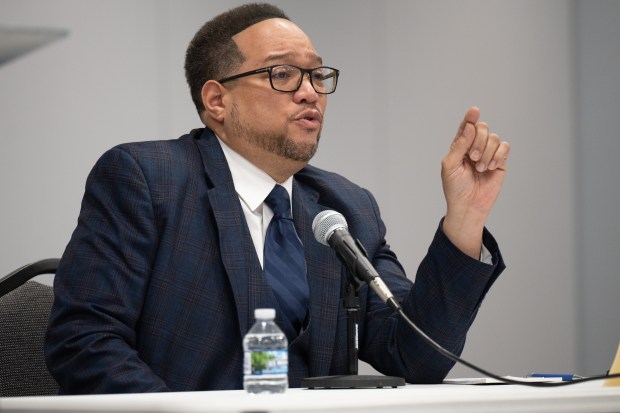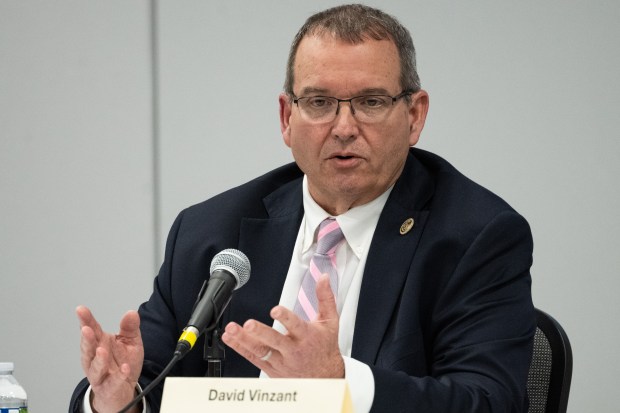Gary politicians have controlled the state Senate District 3 seat for more than 50 years, from Rudy Clay to Earline Rogers to Eddie Melton.
Former Hobart city councilman David Vinzant upset the Gary stranglehold in January when he eked out a narrow Democratic caucus win to finish out the term of new Gary Mayor Eddie Melton.
Vinzant hopes his success string continues in the May 7 primary when he again faces caucus opponent Gary city councilman Mark Spencer, the hand-picked choice of Melton.
The district includes parts of Gary, Hobart, Lake Station, New Chicago and Merrillville.
Both candidates vow to pay close attention to each of the communities in the district and they expect a close contest, hinging on voter turnout.
There’s a geographic divide in the race with Gary officials aligned behind Spencer and leaders in Hobart, Lake Station and New Chicago backing Vinzant, who maintains a campaign headquarters at 39th Avenue and Broadway in Gary.

Vinzant, a retired software business owner and former Hobart Chamber of Commerce president, spent 16 years on the Hobart City Council and he said that experience guides him on the Senate.
Vinzant thinks the district’s makeup is on his side.
“The lines have all moved and it’s a different situation. It’s not as lopsided to Gary as it has been for a number of years,” said Vinzant.
The state approved new district maps after the 2020 census, but Gary precincts still dominate District 3.
“I’m going at it from the standpoint that whoever gets sent should have an understanding of the legislative process and development benefits to the 3rd district,” said Vinzant.
“That’s my strong point, and my background on the city council.”
He cited his work last year in working with former Hobart mayor Brian Snedecor and state lawmakers to ease the burden on Hobart’s budget after Southlake Mall successfully appealed its tax assessment, stripping millions from Hobart’s budget.
“I spent a lot of time in Indianapolis,” he said on the Hobart tax issue. “After having done that and feeling it was a positive experience, I felt I could do this,” he said of the Senate race.
“The piece I learned was not to go down and say I have a solution. The trick is to say I have a problem and let me tell you how big and nasty it is and how it can affect your hometown,” Vinzant said of making his pitch to Republicans.
He served on six Senate committees, including Homeland Security and Transportation, Veterans Affairs and the Military, Pensions and Labor, Public Policy, Commerce and Technology and Utilities.
“I really like the committee work, that’s where I felt the most at home,” said Vinzant. “I wasn’t afraid to ask the hard questions.”
If he retains his seat, Vinzant said he’ll focus on additional funding for basic payrolls for cities and towns so they can continue to pay their first responders who often leave for better-paying jobs.
Creating jobs in the district and economic development are his other key targets.
Both candidates face difficult odds of moving legislation through the GOP supermajority in both chambers. Both, however, say they have the wherewithal to work with Republicans effectively.
Spencer joined the Gary city council in October via a caucus vote and was elected to the at-large seat in November.
He leans into his background as an educator for the past 32 years. He’s the director of Performing Arts for the Gary Community School Corp. and coaches younger instructors.
The move from education into politics represented a natural progression, Spencer said. “I felt a desire, as I matured, to serve in a new capacity.”
While his time on the council has been short, Spencer said it’s been invaluable.
“I’ve learned to move anything forward, you have to have a clear, concise commitment and work together for a common goal,” he said.
He’s proud of a resolution he wrote calling for firearms safety and education, including the safe storage of guns.
During his time as a Gary educator, Spencer said he’s lost 18 students to gun violence. “It’s traumatizing,” he said.
Spencer said his education background puts him in a strong position to deal with its funding, which accounts for about half of the state budget.
He said there’s only a few active educators in the General Assembly. “I have an understanding on the front lines of these issues,” said Spencer who cited the failure of a state law that led to the state takeover of Roosevelt High School, which is now closed.
Spencer said he’s also interested in improving mental health services.
“I want to make sure we have legislation in place to de-stigmatize those in need of services,” he said
As for pushing his legislation through a GOP statehouse, Spencer cited long-time relationships with influential Republicans, like state Sen. Ed Charbonneau, R-Valparaiso.
He said Charbonneau taught him lawmakers were in the people business. “It’s not foreign to me to be able to negotiate and express the needs of those who are in local leadership and need assistance.”
Carole Carlson is a freelance reporter for the Post-Tribune.





